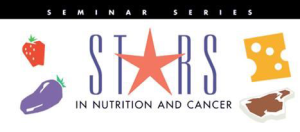The Nutritional Science Research Group (NSRG) promotes and supports studies establishing a comprehensive understanding of the precise role of diet and food components in modifying cancer risk and tumor cell behavior. This focus includes approaches to characterize molecular targets and variability in individual responses to nutrients and dietary patterns. NSRG supports basic, translational, and clinical studies to understand the interplay between nutrition and the microbiome, the underlying mechanisms implicated in cancer prevention, as well as the interplay between genetics, gene expression, and dietary intake. The current focus is on the role of prebiotics and probiotics found in food or food components, their interaction with members of the gut, mouth, and skin microbiota, and their role in carcinogenesis and metabolism. NSRG also collaborates with several federal partners, hosts trans-NIH nutrition workshops, participates in interagency and extramural nutrition working groups, and conducts scientific outreach to advance nutrition research.
National Food and Nutrient Analysis Program
The group jointly supports the National Food and Nutrient Analysis Program (NFNAP) with other stakeholder partner agencies, including the Centers for Disease Control and Prevention, Food and Drug Administration (FDA), and US Department of Agriculture (USDA) , to achieve improvements in nutrient values and prevent disease and promote health. NFNAP developed, oversees, and administers an integrated body of data on the nutrient composition of foods that are commonly consumed by Americans. The data collected through the program are maintained by USDA and include data on over 8,800 branded and generic foods and up to 150 food components consumed by all Americans, including minority populations. Data on dietary supplements and bioactive components, such as vitamin D and trans-fatty acids, are also available.
Interagency Agreements
The group collaborates with the USDA Food Components and Health Laboratory to investigate the potential efficacy of promising cancer-preventive dietary agents in clinical feeding studies and determine their mechanisms of action. NSRG also works with FDA’s National Center for Toxicity Research to study the genetics and epigenetics of susceptibility to dietary-induced non-alcoholic fatty liver disease using mouse strains.
Scientific Outreach
Stars in Nutrition & Cancer Lecture Series

The group runs the Stars in Nutrition & Cancer lecture series, featuring extraordinary contributors in the field of cancer and nutrition research. Speakers highlight the important role that nutrition plays in modifying cancer development. Recent lectures can be found in Videos and Webinars. All past lectures can be viewed on the NIH VideoCast website.
John Milner Nutrition and Cancer Prevention Research Practicum

In addition, the group runs the John Milner Nutrition and Cancer Prevention Research Practicum, a one-week educational opportunity in nutrition and cancer prevention research for individuals with a sustained commitment to nutrition and health promotion. This intense learning session provides specialized instruction in the role of diet and bioactive food components as modifiers of cancer incidence and tumor behavior.
Dr. John A. Milner (1947-2013), was an internationally respected scientist known for his work in human nutrition and cancer prevention. It is in his honor that this practicum is convened. Dr. Milner served as Chief of the NCI Nutritional Science Research Group in the Division of Cancer Prevention from 2000 to 2012.
Other Nutritional Resources
Consumer Information about Diet and Cancer can be found at the main NCI webpages.
Important Reports
- AICR/WCRF Third Expert Report
Released in 2018 - Dietary Reference Intakes for Sodium and Potassium
Released: March 05, 2019
Potassium and sodium are interrelated, essential nutrients that play vital roles in the body to maintain physiological homeostasis. Both nutrients have been linked to risk of chronic disease, particularly cardiovascular disease. Additionally, a possible association of sodium intake with other adverse health outcomes has been suggested. The coexistence of essentiality with a relationship to adverse health effects, including chronic disease, called for a new approach to establishing intake recommendations for potassium and sodium within the context of the Dietary Reference Intakes (DRIs). - Examining Special Nutritional Requirements in Disease States: Proceedings of a Workshop
Released: June 29, 2018
An ad hoc committee planned a workshop exploring the evidence for special nutritional requirements in disease states and medical conditions that cannot be met with a normal diet. - Implementing a National Cancer Clinical Trials System for the 21st Century - Second Workshop Summary
Released: July 15, 2013
Recognizing the recent transformative advances in cancer research that necessitate modernization in how cancer clinical trials are run, as well as inefficiencies and other challenges impeding the national cancer clinical trials program, the National Cancer Institute asked the IOM to develop a set of recommendations to improve the federally funded cancer clinical trials system. These recommendations were published in a 2010 IOM report. In 2011, the IOM’s National Cancer Policy Forum (NCPF) held a workshop to engage stakeholders in discussions about the changes they planned to implement in response to the IOM report. Two years later, the NCPF held a second workshop in which stakeholders reported the changes that they have made thus far to address the IOM recommendations, and discussed additional actions needed to improve the system.
Archived Links
- Dietary Reference Intakes for Calcium and Vitamin D
Released: November 30, 2010 - Dietary Reference Intakes Essential Guide Nutrient Requirements
Released: September 15, 2006 - The Effects of Omega-3 Fatty Acids on Cancer (AHRQ Report)
Released: February 2005 (Updated January 2006) - Dietary Reference Intakes for Energy, Carbohydrate, Fiber, Fat, Fatty Acids, Cholesterol, Protein, and Amino Acids
Released: September 05, 2002 - Dietary Reference Intakes for Vitamin A, Vitamin K, Arsenic, Boron, Chromium, Copper, Iodine, Iron, Manganese, Molybdenum, Nickel, Silicon, Vanadium, and Zinc
Released: January 09, 2001 - Dietary Reference Intakes for Thiamin, Riboflavin, Niacin, Vitamin B6, Folate, Vitamin B12, Pantothenic Acid, Biotin, and Choline
Released: June 12, 2000 - Dietary Reference Intakes for Calcium, Phosphorus, Magnesium, Vitamin D, and Fluoride
Released: January 01, 1997